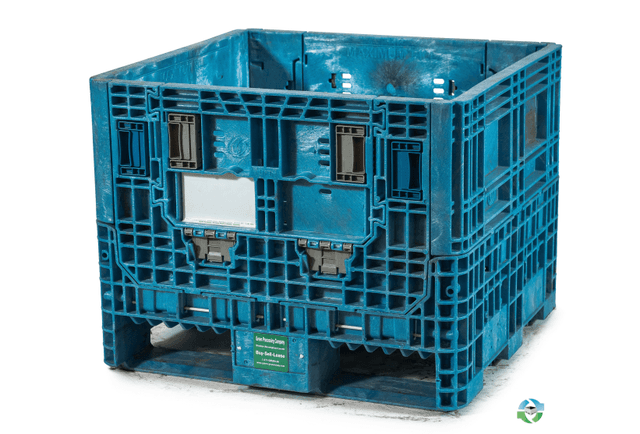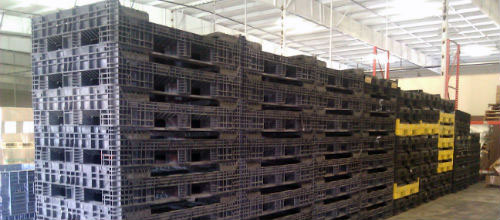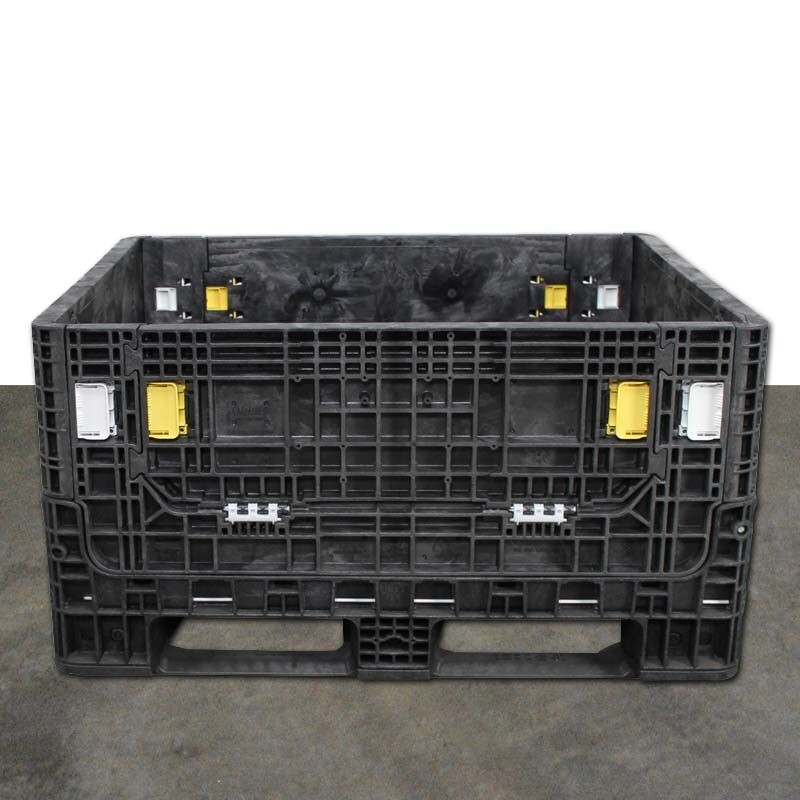Simplify logistics with used collapsible containers for better operations
Wiki Article
Why Bulk Containers Are Crucial for Lasting and Cost-efficient Transport
Mass containers play an important function in modern-day logistics. They promote the reliable motion of large amounts of products, consequently enhancing transport processes. This method not only reduces expenses yet likewise reduces ecological influence through reduced exhausts and waste generation. As sectors seek even more sustainable techniques, the fostering of mass containers is becoming progressively substantial. What ramifications does this change hold for future logistics and supply chain administration?
The Benefits of Utilizing Bulk Containers in Logistics
Bulk containers change logistics by boosting effectiveness and sustainability. These containers enable for the transportation of huge amounts of items in a single journey, noticeably reducing the variety of trips needed. This not just simplifies procedures but also reduces labor costs connected with handling, filling, and discharging. On top of that, bulk containers are designed to enhance space application within transport lorries, making sure that even more products can be shipped concurrently.The standardization of bulk containers also simplifies the logistics process. With uniform dimensions, they can be quickly stacked and saved, leading to improved storehouse management. Mass containers often include sturdy products that protect materials from damage during transit, thus reducing item loss and boosting total dependability. Because of this, organizations can experience improved supply chain efficiency, ultimately resulting in increased earnings and client contentment. This mix of elements makes mass containers a vital possession in modern logistics.
Environmental Influence: Reducing Waste and Carbon Impact
As industries increasingly focus on sustainability, the adoption of bulk containers has actually emerged as an essential technique for reducing waste and decreasing carbon footprints. These containers reduce making use of product packaging materials, such as boxes and plastic, thus especially lowering overall waste generation. By consolidating shipments, bulk containers boost transportation effectiveness, enabling more items to be carried per trip. This decrease in journeys directly correlates with reduced greenhouse gas exhausts, adding to a smaller carbon impact.In addition, mass containers can typically be reused or recycled, better reducing ecological effect. The durability of these containers warranties they can withstand numerous transport cycles, minimizing the demand for single-use alternatives. used collapsible containers. By enhancing logistics and promoting reliable resource use, bulk containers not just support lasting practices however likewise urge industries to straighten with international ecological goals. Ultimately, their application shows a commitment to eco-friendly stewardship and liable source administration
Price Financial Savings: Just How Mass Containers Lower Transportation Expenses
While many firms look for means to improve their profits, the usage of mass containers presents a significant possibility for reducing transport expenses. Mass containers make the most of the quantity of goods transferred, enabling services to ship larger amounts simultaneously. This performance lowers the number of trips needed, directly reducing fuel expenses and lessening labor expenses related to loading and dumping.In addition, bulk containers usually include structured designs that enhance room application within transport cars. This suggests fewer voids, causing more efficient usage of available capacity. The durability of mass containers can lower the danger of item damages during transportation, making sure and reducing losses that more items get here undamaged.
Enhancing Supply Chain Performance With Bulk Storage Space Solutions
Mass storage space solutions play an important duty in enhancing supply chain efficiency by optimizing stock administration. By consolidating items into less, larger containers, companies can considerably minimize taking care of prices connected with frequent transfers and processing. This structured approach enables better monitoring and management of inventory, inevitably resulting in boosted functional performance.Streamlined Inventory Administration
Efficient supply administration is necessary for enhancing supply chain procedures, specifically when companies adopt bulk storage options. These remedies make it possible for businesses to preserve higher stock degrees while minimizing the frequency of replenishment. By consolidating materials into bulk containers, firms can streamline their supply procedures, minimizing the complexity linked with tracking multiple smaller packages. This technique promotes accurate inventory counts and boosts forecasting accuracy, enabling even more educated decision-making. Furthermore, mass storage space solutions streamline warehouse organization, making it easier to situate and gain access to items when required. Consequently, companies can attain an extra effective supply turnover price, inevitably enhancing general supply chain performance and lowering the chance of stockouts or overstock scenarios.
Lowered Handling Costs
The execution of bulk storage space solutions not just improves supply administration yet likewise considerably decreases managing expenses throughout the supply chain. By combining materials right into bulk containers, firms minimize the requirement for frequent handling and transfer between informative post various storage space and transport units. This approach reduces down on labor costs related to loading, dumping, and relocating smaller plans. Additionally, bulk storage lowers the regularity of shipments, resulting in lower transportation expenses and decreased gas intake. As a result, companies can maximize their logistics operations, enabling for a much more reliable allowance of sources. Eventually, lowered handling costs add to boosted total supply chain effectiveness, promoting a setting that sustains both sustainability and economic viability.
Convenience of Mass Containers Across Different Industries
Many industries have unique needs for transport and storage space, mass containers have arised as a versatile service that fulfills a large range of requirements. These containers, varying from huge bins to specialized containers, can accommodate diverse materials, including powders, liquids, and granules. In the agricultural sector, bulk containers promote the transportation of fertilizers and grains, while the food and beverage sector uses them for components and completed products. The chemical market counts on bulk containers for safely delivering unsafe materials, making sure compliance with safety and security regulations. In addition, building and construction firms take advantage of bulk containers for delivering aggregates and various other products. Their adaptability includes numerous settings of transport, consisting of trains, ships, and trucks, boosting logistical effectiveness. This adaptability not only simplifies procedures throughout different industries yet likewise promotes sustainability by minimizing product packaging waste and optimizing area in transit. Consequently, bulk containers play a necessary duty in contemporary supply chain monitoring.Future Patterns in Mass Container Use and Sustainability
The future of bulk container use is significantly formed by innovative products development that boosts sustainability. In addition, automation in logistics assures to enhance procedures, reducing waste and boosting performance. Embracing circular economic climate practices will certainly additionally transform just how bulk containers are made, made use of, and reused, promoting a much more sustainable transportation landscape.Innovative Products Advancement
As industries significantly prioritize sustainability, cutting-edge materials development wholesale containers emerges as a significant element in boosting environmentally friendly transport options. Suppliers and scientists are discovering naturally degradable plastics, recycled composites, and light-weight steels to lower environmental impact. These materials not only reduce waste yet likewise boost gas efficiency by reducing the general weight of containers. Additionally, advancements in clever products, which can adjust to differing problems, enhance the durability and functionality of bulk containers. The combination of these innovative products aligns with circular economic climate concepts, advertising reuse and recycling. As the demand for sustainable practices expands, the advancement of such products will certainly play a vital role in shaping the future of mass container usage in logistics and transport.Automation in Logistics
Substantial improvements in automation are positioned to change logistics and the usage of bulk containers, improving sustainability in transport. Automated systems, including drones and self-governing cars, are enhancing the movement of bulk containers, reducing the dependence on traditional fuel-powered transportation. These innovations optimize directing and loading processes, decreasing empty miles and enhancing gas performance. In addition, automated stock management systems boost tracking and tracking of mass containers, making certain far better resource allowance and minimized waste. The assimilation of the Web of Points (IoT) permits real-time information evaluation, enabling positive decision-making that straightens with sustainability objectives. As automation continues to progress, it is expected to drive better developments wholesale container usage, eventually sustaining more sustainable logistics methods and minimizing the environmental influence of transportation.Circular Economic Climate Practices
Innovations in automation are setting the phase for a much more integrated technique to round economic situation methods in the domain of mass container usage. As sectors progressively embrace sustainability, bulk containers are being created for durability and reusability. This change not just minimizes waste but also enhances source performance. Firms are adopting approaches such as closed-loop systems, where made use of containers are gathered, reconditioned, and reestablished right into the supply chain. In addition, wise technologies track container life cycles, promoting much better monitoring and lowering ecological effect. The collaboration in between manufacturers, logistics carriers, and end-users is crucial in developing requirements for sustainable container usage. refurbished bulk containers. Future patterns show a growing emphasis on products that are eco-friendly and recyclable, more reinforcing the visit circular economic situation's principles in bulk transportation
Regularly Asked Questions
What Products Are Mass Containers Usually Made From?
Mass containers are typically created from sturdy materials such as high-density polyethylene, aluminum, cardboard, and steel. These products provide security, toughness, and versatility, making them suitable for delivering numerous products in various industries efficiently.Exactly how Do I Select the Right Size Mass Container?
Picking the appropriate dimension bulk container includes examining the volume of materials to be delivered, considering managing devices compatibility, and assessing storage area needs. Proper dimension guarantees effectiveness in transportation and minimizes waste during delivery.Are Bulk Containers Reusable or Recyclable?
Bulk containers are commonly multiple-use, made for multiple journeys, boosting sustainability. Lots of can additionally be recycled, relying on the products utilized. Choosing recyclable choices even more sustains ecological objectives and decreases waste in resource transportation practices.What Safety Regulations Put On Bulk Container Transportation?
Security regulations for bulk container transport consist of conformity with the Department of Transportation standards, appropriate labeling of hazardous products, structural integrity evaluations, and adherence to weight restrictions to assure safe handling and prevent accidents during transit.Just How Can Organizations Shift to Making Use Of Mass Containers Effectively?
Services can alter to bulk containers by reviewing current logistics, educating personnel on handling, buying appropriate equipment, optimizing inventory administration, and teaming up with distributors to guarantee compatibility and effectiveness throughout the supply chain.
As industries progressively prioritize sustainability, the adoption of mass containers has arised as an essential technique for minimizing waste and reducing carbon impacts. By combining materials into bulk containers, business can enhance their stock processes, decreasing the intricacy linked with tracking multiple smaller sized plans. As markets significantly focus on sustainability, innovative products growth in mass containers arises as a substantial variable in enhancing green transport remedies. Automated systems, including drones and self-governing automobiles, are improving the movement of mass containers, reducing the dependence on traditional fuel-powered transport. Additionally, automated inventory management systems improve monitoring and tracking of mass containers, making sure far better resource allocation and lowered waste.
Report this wiki page